This is an expansion on my previous post. If you haven’t already seen the entire first season and read part 1, I suggest you do so first.
=== Spoilers Galore! ===
Holy Cow were the creators of this show able to pack a lot of references into a simple, familiar package. Rewatching it again by jumping around in sequence has led to different details and interrelations standing out, so there’s certainly more to discuss. I’ll start out with comments on some of the key characters I neglected last time, then detail a couple more symbolic themes to lay the groundwork for more integrative territory (Or, half-baked mania, as the case may be.)
To recap, I associated Will with the connection to higher, Divine Will and I’m looking at the show from an allegorical perspective of the Divine Union – the balanced integration of care and will, masculine and feminine – as the means to find this connection.
Mike, Lucas, and Dustin – The ABCs of Friendship

Our intrepid party of rather-tall Hobbits serves as another representation of a polarity of psycho-spiritual traits and the balance and integration between them. Mike is more intuitive, care-driven, and trusting, while Lucas is more skeptical, action-oriented, and independent. Fortunately, Dustin is there to uphold “The Rule of Law” and make sure their fights don’t ruin the friendship. Dustin shares some traits with both of them and can translate his understanding between them. Poor Dustin takes on a lot of responsibility for the group, which comes out best in the lines where he vents his total exasperation.
“Sometimes your total obliviousness just blows my mind. He’s your best friend right? […] Then this girl shows up and starts living in your basement and all you ever want to do is pay attention to her.”
-“That’s not true!”
“Yes it is. And you know it, and he knows it. But no-one ever says anything until you both start punching and yelling at each other like goblins with Intelligence scores of zero.”
The gang may be short in years, but they’re actually more advanced in their valuation and practice of friendship than any other characters in the show. They’re all fierce advocates of their own perspectives and they definitely fight a lot, but they also live by a code and are willing to own up to their transgressions once they see their fault. It’s easy to imagine that their socially marginal position in the dark dimension called “Middle School” has helped them better appreciate real acceptance and loyalty. I identified Joyce and Hopper as the exemplars of the internal integration of forces and the boys are illustrating balanced integration in the external, social realm.
When Lucas splits off after he and Mike fight, the lesson he’s presented with is parallel to Johnathon’s – namely that he can’t do it alone. At some point, trust and reliance on others is required. (Although, come to think of it Lucas going off alone was hardly bad in itself. He basically succeeded in locating the gate and was able to warn the others about the descending hordes of Bad Men. So… interdependence is superior to either total independence or total unity). Mike’s lesson is parallel to his sister Nancy’s – don’t let the excitement of new love blind you to the needs and desires of your existing friends.
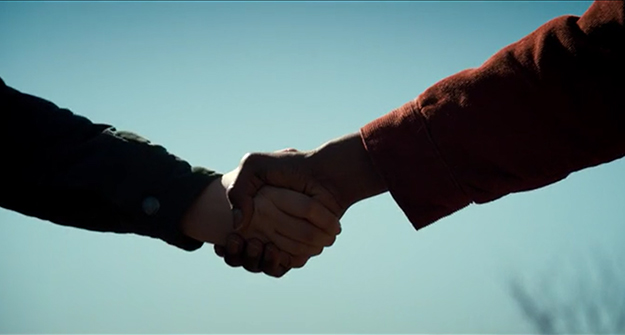
As I said last time, Eleven’s experiences of true care and friendship help her to find internal strength and summon the courage to face the Demogorgon. The jump to the intro sequence in Chapter 7 comes when Mike and Lucas finally shake hands to reconcile. My impression was that this was just as “supernatural” a moment as any of the others used for this cut. Friendship is shown as an alchemical act that not only becomes more than the sum of its parts, but makes the parts themselves more than they were.
Barbara and Nancy – Inner Strength vs. Social Pressures
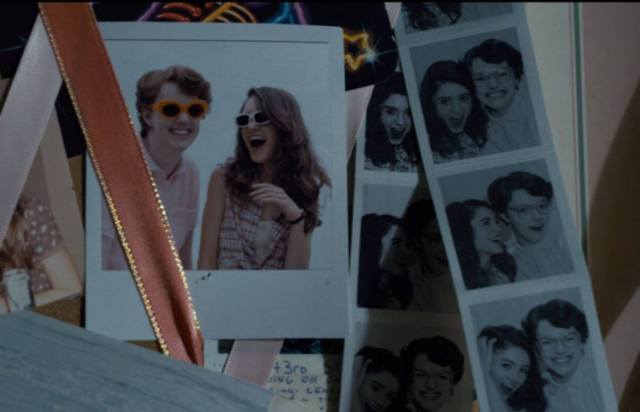
Clearly Besties!
There’s been a big stir of support and outrage over Barb. It’s understandable, seeing as the show gives a rather marginal treatment to the friend who’s already treated marginally. I must say, though, that the evidence in the show doesn’t leave her totally faultless. Don’t get me wrong – I really liked both Barb and Nancy and it’s not like I “had my shit together” in High School!
In terms of the larger theme, Barb is tragically lacking in will and a sense of self-respect. Even though she may know better she acquiesces to Nancy’s desires every step of the way. As Dustin, Joyce, and El illustrate throughout the show, sometimes the only way to stand in your own power and for what’s right is to firmly say “no“. Barb is too wounded by Nancy’s indifference, though, and actually fails them both by bowing out again. She shows her unfailing loyalty by waiting at the house, but I think it’s not the kind of loyalty Nancy needed just then. Nancy needed some harsh truth about the damage she was causing to their relationship. “Remember how you told me to protect you from getting drunk and doing something stupid? This is it. You want to have fun while I drive home alone with a bleeding hand? Fine, but don’t say I didn’t tell you so.”
Instead, she broods by the pool. If this had been a straight drama instead of horror, the drops in the water could just as well have been tears alone. This scene makes me wonder if the Demogorgon, which is psychic after all, is drawn to emotional wounds as much as the flesh variety. With Nancy’s betrayal, Barb lost her protection from really internalizing the “frumpy sideliner” personification of her peers and it saps her of her power. The weight of her dejection is already pulling her into inner darkness, so perhaps the monster found it that much easier to find her and drag her all the way.
To be sure, Barb’s short-falling as a friend is trivial compared to Nancy’s, even though she pays the ultimate price. So I’m afraid I’m not done with Nancy either. I mentioned last time how Steve is deeply culturally programmed and so is Nancy when we meet her. The butterfly stickers Steve spontaneously points to in Nancy’s locker (with his smug-flirtatious “Hmm”) may be a nod to Monarch mind control, while the teddy bear Steve uses to ironically scold himself could be another nod (in addition to referencing Scream). However, the parallels aren’t literal. The form of control she’s under is of a more prosaic and subtle cultural kind.
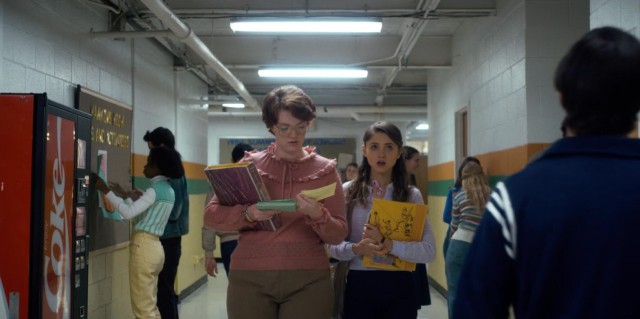
Nancy is living in a world where being considered “good” and praiseworthy is more about checklists of standards, not real goodness or character. The studying we see her doing for the chemistry test consists solely of rote memorization with flash cards. Pure, context-free memory and recall. She even spits out the answer before Steve finishes reading a question. Now, this must also be a product of her educators’ style, but it goes to show that in such an environment one can earn top grades without really being challenged or developing durable, higher-level skills. (I was fortunate to have a High School chemistry teacher who was a real harsh stickler about demonstrating flexible understanding. My grades in that class were purdy mediocre. I sure was glad for the experience when I got to College level, though).
I find it disturbing how, whenever Nancy tries to stand up for herself or express discomfort early on, Steve’s responses are dismissive and belittling, yet Nancy is still hopelessly charmed by the playful tone. What’s going on here? While the face of the show is a massive love note to retro American pop culture, the back side gestures towards the darker aspects. We don’t really see direct evidence in the show, but we all know the movie stereotypes – e.g. the “charming bad boy” who comes into the life of the “good girl” and shakes it up with excitement. Nancy doesn’t even realize it, but she’s been conditioned to respond positively to this brand of brash self-assurance. Steve has “All the Right Moves”.
Johnathon observes that she’s “just another suburban girl who thinks she’s rebelling by doing exactly what every other suburban girl does,” but he doesn’t appreciate that she’s not really trying to rebel. Her mistaking of Steve’s advances as real care, and of her decision to have her first sex with him as real romance are unfortunate, but wouldn’t have catalyzed tragedy but for the simple fact that teenage sex was taboo. She almost had to sneak around social standards just to explore this basic part of the human experience. Who knows, maybe she had never been so dishonest before, but once she decided to take Steve’s invitation to the wild side she was getting there by hook or by crook. Her real tragedy is that she got so carried away she treated Barb like just another obstacle.
Nancy’s mom tries to be supportive. She pleads with Nancy that “you can talk to me”, but the accusation lacing her questions (“So is Steve your boyfriend now?”) doesn’t inspire much confidence. Unfortunately, her mom isn’t the only one Nancy has to worry about. The next day at school she feels like eyes of judgement are cast upon her. It’s not as if sex “outside of bounds” is unheard of in the community, but the double-standards between men and women are stark. Hopper has gotten around, but the worst he has to face is snickers from his fellow cops and a witheringly dry tell-off from the librarian. Nancy has to navigate a schizoid set of judgements where she’s openly shamed as being either a slut, or as somehow too pure and haughty.
As for why Nancy ends up staying with Steve, I hesitate to pin it down to one thing because the show doesn’t explain much at the end. There’s the positive, self-empowered aspect: that she really did sense Steve’s basic goodness and he made big, tangible strides to redeem himself. There’s also the dis-empowered, bowing to social standards aspect: that staying with Steve was the easiest way to dispel the slut label, and that Steve, unlike Johnathon, is from a “normal” family with money and good social standing. Nancy and Steve both learn hard lessons about what real care means. They’ve grown a lot already, but I feel like their potential trajectories in particular could still have big twists going forward.
“You Really Need To Learn More About Compasses”
Dustin’s awareness of basic truths goes beyond relationship dynamics. His incredulous admonishments of Mike and Dustin for their ignorance of the science of compasses is directed out of the screen to the audience as well.
The kids’ quest is informed by science and helped along by technology. While these prove useful tools, ultimately they’re not enough. First, Eleven is able to find Will and form a link helped by the walkie-talkie. When he slips too far away, she’s able to reconnect by upgrading to the new, serious business radio kit in the A/V club. After this, they make progress only by sliding down the complexity scale. Mr. “Encyclopedia” Clarke’s insight that an inter-dimensional gate would create an electromagnetic disturbance leads the kids to hunt it down using the simplest of navigation devices. (“Do you see a battery pack? No, because it doesn’t need one.”) When the disparate characters come together at last, El again tries the radio to no avail. In the end, she can only find Will and Barb in the sensory deprivation bath, where she herself becomes the compass needle!
The needle of a compass can only align with the relatively subtle magnetic field of the Earth is because it’s floating in water, free from the more powerful forces of friction that would otherwise hold it in place. Similarly, Eleven shows that technological means pale in comparison to her internal power when freed from the friction of material, sensory consciousness. She’s also quite directly making up for manipulating the boys’ compasses before and facing her own, deep-seeded fears.
But Eleven is so much more than a magnetized sliver of metal. She’s a human being and isn’t limited to passively aligning with a powerful force. Through her inner space, she can connect to all things – align herself wherever she chooses to reach out and direct her attention. The Men Who Stare At Goats may be a typical limited hangout, but at least it nudges the audience with the opening card – “More of this is true than you would believe”. (For a lab that’s doing fascinating work in the open using nifty science tools to investigate remote viewing and the interconnections of consciousness see here.)
I know I’m going to get back on top of my neglected meditation practice. Thanks, El!
I like Vigilant Citizen’s idea that the gate is metaphorically disrupting the moral compasses of the whole town, and I would extend it further. The very term “true North” shows the high conceptual correspondence between truth and morality. I characterized the Upside Down as a realm of collective Shadow, so the subtle, internal guides that should lead people to Truth and Right instead point to the obfuscations of the powerful and the gateway to inner, submerged darkness! No wonder the town’s jerks and buffoons are so sure of themselves and the world, while those hunting for Will and Barb are torn apart in angst. They’re the ones sensitive enough to feel something is wrong from the pull of what’s actually right. If courageous action is the actualization of the Divine Union, we can add that sensitivity is a key factor which leads to it. I can’t find the original source, but this quote attributed to philosopher Henri Bergson encapsulates this theme of the show perfectly.
“Fortunately, some are born with spiritual immune systems that sooner or later give rejection to the illusory worldview grafted upon them from birth through social conditioning. They begin sensing that something is amiss, and start looking for answers. Inner knowledge and anomalous outer experiences show them a side of reality others are oblivious to, and so begins their journey of awakening. Each step of the journey is made by following the heart instead of following the crowd and by choosing knowledge over the veils of ignorance.”
Eleven Means Exactly What She Says – Pain and Duality
Upon reading and reflecting more, I now have no doubt that The Demogorgon is an aspect of Eleven herself. See this excellent video for a rundown of the clues and reasoning behind this. When Eleven confesses to Mike, we’re led to accept his interpretation that she’s just being hard on herself.
“The gate… I opened it. I’m the monster.”
But, while Eleven uses metaphors to explain certain abstract concepts, she’s otherwise right to the point.
I add to this one more flagrant, symbolic clue. In addition to the magical force, one of the prime esoteric meanings of the number 11 is duality, both its schism and its synthesis. 11 is an even more extreme expression of polarity than 2. It’s 1 and 1. If 1 is unity, 11 is as if unity has split into two aspects both asserting independent wholeness. This writer is a wee bit rash in his snootiness: “while a stoner’s post-bong-hit observation in support of this corollary might go, ‘Dude, the number 11 reads the same right side up and upside down — whoa!'”
… uh yes, and forwards and backwards too! A reflection of itself [puff, puuuuff] – just like Eleven reflected in the void space.
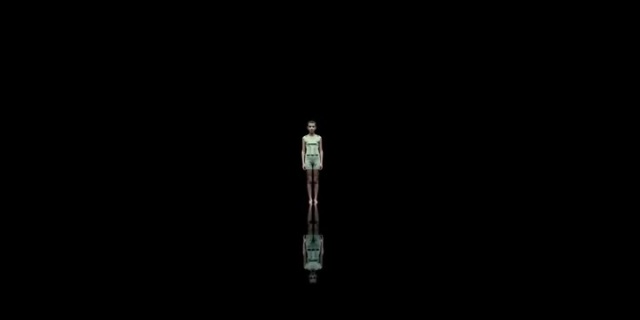
This meaning is very widespread in esoteric thought, but I’ll just cite a couple instances from what I know (low-level Wizard here). Note the dual pillar theme in play on the Tarot cards II and XI
From “The Temple Of Solomon The King” by Aleister Crowley – (Part 1 – The Universe As It Is)
10. The Decad, the divine End. Represents the 1 returning to the 0. Derived from 1 + 2 + 3 + 4.
11. The Hendecad, the accursed shells, that only exist without the divine Tree. 1 + 1 = 2, in its evil sense of not being 1.
I speculated last time that the monster was Eleven’s awareness of the beastly system of abuse she was imprisoned in, but I think we can get more specific. I favor the idea that MK Ultra and related programs are probably more about psi phenomena than “mind control”. For one, LSD and other psychedelics are a terrible choice for this purpose. For another, if one accepts the existence of Satanic ritual abuse practices, then effective mind control techniques were already known from antiquity. The core method of ritual abuse and modernized trauma-based mind control is to create splits in the personality through a series of traumas, ideally starting in infancy. Stranger Things could certainly be a limited hangout in this because even if only a small fraction of the alleged techniques involved are true, what we see of Eleven’s abuse would still be the G-Rated version. Note, however, the line extending between Papa’s legs in her drawing, which hints at sexual abuse.
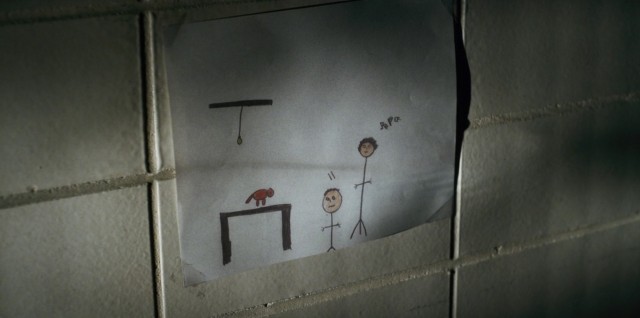
Creating a split personality isn’t presented as the purpose of the research at Hawkins Lab, but the corollaries are easy to draw. Eleven had to maintain a conscious perception of Dr. Brenner as her beloved “Papa”, while burying all awareness of the truth that he was her prime tormentor. She had to go along with the tasks demanded of her, even though she must have been aware her efforts were to be used for evil purposes. So, she attached all this darker, painful awareness onto something else.
The cabal in Hawkins Lab was trying to reach the heights of hidden knowledge through abusive methods. They couldn’t even predict the catastrophic consequences. The void world of Eleven’s sensory deprivation trances ties into the undersea imagery of The Upside Down. In her inner mental space she’s skating on the boundary layer between the surface and the submerged. Here, she can find things that exist in The Upside Down, but isolated in this middle realm. The gate opens when she makes contact with The Demogorgon. It’s as if once she touches it she is made instantly aware of their co-identity. She recoils in sheer horror, but she cannot escape the bond. She flees so violently that she rips a hole out of the realm of Shadow itself.
This theory helps bring things back around to where I started. Even after I identified Will as symbolizing The Magician card and Keter at the crown position in the Tree of Life, I was still bothered by the question of why he was taken. Remembering the dualistic aspect of the number 11 provided an answer. Crowley’s point of 11 being “the accursed shells, that only exist without the divine Tree” is very relevant here. Looking again at the cover image, Eleven occupies roughly the position of Daath (Knowledge).
Daath is not, properly, one of the ten Sephiroth. It is the soul in complete unity – the undifferentiated seed from which the rest of the tree grows. El was a pure and innocent child, but her sufferings split her in two. Metaphorically, the 0 or [no number] was forced into 11, and the very foundations of the Tree were sundered. The mystical state of Keter, the intermediary with the divine Will, is only achieved through balanced integration and so was the first to be lost.
This leads to the question: can all of the key characters in Stranger Things be related to the Tree Of Life? I’ve got some ideas to share in the next installment…
I’ll give you a hint, though. The cover image only decodes it so far.














Pingback: Stranger Things - was Eleven sexually abused at the lab? TRIGGER WARNING - Stories From Reddit